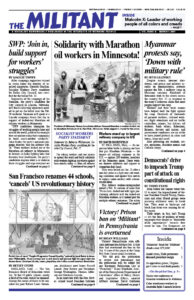Victory! Pennsylvania state officials informed the Militant Feb. 12 that they had overturned the ban on the Jan. 4 issue of the paper at the Camp Hill State Correctional Institution.
“We did pull the publication to review and determined that the publication will be added [to] our Reviewed Publication List as ‘Permitted,’” Diana Woodside, director of the Pennsylvania Department of Corrections’ office of Policy, Grants and Legislative Affairs, emailed Militant attorney David Goldstein Feb. 12. “The SCI will be instructed to deliver the publication to the inmate.”
The Militant had received a letter from our inmate-subscriber Jan. 25 reporting the ban and sending a copy of the denial form. Goldstein spoke with Woodside Feb. 1 and sent her the denial notice and a PDF file of the issue. He requested that the impoundment be reversed, saying otherwise the Militant would file a “substantive appeal.”
“We fight every time prison officials anywhere try to ban the paper, and in most cases we win,” said Militant editor John Studer. “Prisoners have the right to read and think about political views and speak out on political issues and social struggles. And the Militant has a constitutional right to reach its readers.”
According to its denial form, officials at the Camp Hill State Correctional Institution impounded the Jan. 4 issue because “Socialist Workers Party Action, speaks on social unrest and standing against law enforcement.” Prison authorities were most likely referring to the Socialist Workers Party action program, the SWP’s election campaign platform that the paper has run dozens of times over the past year for its candidates in both 2020 and 2021.
Institution officials claimed the article could “create a danger within the context of the correctional facility.”
Pennsylvania has the second-largest number of inmate subscribers to the Militant in state prisons across the country, after Florida.
This is the second time the paper has succeeded in overturning an impoundment at Camp Hill. Last July an issue of the Militant sent to a different subscriber was banned there, but state officials reversed that ban also.
“Fighting these efforts to ban the Militant every time they happen is part of the broader working-class struggle against attacks on political rights, free speech and of the press,” said Studer. “Whenever this issue comes up — anywhere, anytime — we will respond. And we get widespread support.”

